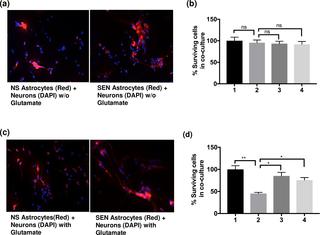Our official English website, www.x-mol.net, welcomes your feedback! (Note: you will need to create a separate account there.)
Astrocyte senescence promotes glutamate toxicity in cortical neurons.
PLOS ONE ( IF 3.7 ) Pub Date : 2020-01-16 , DOI: 10.1371/journal.pone.0227887 Chandani Limbad 1, 2 , Tal Ronnen Oron 1 , Fatouma Alimirah 1 , Albert R Davalos 1 , Tara E Tracy 1, 3, 4 , Li Gan 3, 4 , Pierre-Yves Desprez 1, 5 , Judith Campisi 1, 6
PLOS ONE ( IF 3.7 ) Pub Date : 2020-01-16 , DOI: 10.1371/journal.pone.0227887 Chandani Limbad 1, 2 , Tal Ronnen Oron 1 , Fatouma Alimirah 1 , Albert R Davalos 1 , Tara E Tracy 1, 3, 4 , Li Gan 3, 4 , Pierre-Yves Desprez 1, 5 , Judith Campisi 1, 6
Affiliation

|
Neurodegeneration is a major age-related pathology. Cognitive decline is characteristic of patients with Alzheimer's and related dementias and cancer patients after chemo- or radio-therapies. A recently emerged driver of these and other age-related pathologies is cellular senescence, a cell fate that entails a permanent cell cycle arrest and pro-inflammatory senescence-associated secretory phenotype (SASP). Although there is a link between inflammation and neurodegenerative diseases, there are many open questions regarding how cellular senescence affects neurodegenerative pathologies. Among the various cell types in the brain, astrocytes are the most abundant. Astrocytes have proliferative capacity and are essential for neuron survival. Here, we investigated the phenotype of primary human astrocytes made senescent by X-irradiation, and identified genes encoding glutamate and potassium transporters as specifically downregulated upon senescence. This down regulation led to neuronal cell death in co-culture assays. Unbiased RNA sequencing of transcripts expressed by non-senescent and senescent astrocytes confirmed that glutamate homeostasis pathway declines upon senescence. Our results suggest a key role for cellular senescence, particularly in astrocytes, in excitotoxicity, which may lead to neurodegeneration including Alzheimer's disease and related dementias.
中文翻译:

星形胶质细胞衰老促进皮质神经元的谷氨酸毒性。
神经变性是与年龄相关的主要病理。认知下降是阿尔茨海默氏症和相关痴呆症患者以及化学或放射治疗后癌症患者的特征。这些及其他与年龄有关的病理学的最新驱动因素是细胞衰老,这是一种细胞命运,需要永久的细胞周期停滞和促炎性衰老相关的分泌表型(SASP)。尽管炎症和神经退行性疾病之间存在联系,但是关于细胞衰老如何影响神经退行性病变仍有许多悬而未决的问题。在大脑的各种细胞类型中,星形胶质细胞最丰富。星形胶质细胞具有增殖能力,对于神经元生存至关重要。在这里,我们研究了通过X射线照射而衰老的人类星形胶质细胞的表型,并鉴定出编码谷氨酸和钾转运蛋白的基因,这些基因在衰老时被特异性下调。这种下调导致在共培养试验中神经元细胞死亡。非衰老和衰老的星形胶质细胞表达的转录物的无偏RNA测序证实,谷氨酸稳态途径在衰老后下降。我们的结果表明细胞衰老,尤其是星形胶质细胞在兴奋性毒性中的关键作用,这可能导致神经退行性变,包括阿尔茨海默氏病和相关的痴呆。非衰老和衰老的星形胶质细胞表达的转录本的无偏RNA测序证实,谷氨酸稳态途径在衰老后会下降。我们的结果表明细胞衰老,尤其是星形胶质细胞在兴奋性毒性中的关键作用,这可能导致神经退行性变,包括阿尔茨海默氏病和相关的痴呆。非衰老和衰老的星形胶质细胞表达的转录本的无偏RNA测序证实,谷氨酸稳态途径在衰老后会下降。我们的结果表明细胞衰老,尤其是星形胶质细胞在兴奋性毒性中的关键作用,这可能导致神经退行性变,包括阿尔茨海默氏病和相关的痴呆。
更新日期:2020-01-17
中文翻译:

星形胶质细胞衰老促进皮质神经元的谷氨酸毒性。
神经变性是与年龄相关的主要病理。认知下降是阿尔茨海默氏症和相关痴呆症患者以及化学或放射治疗后癌症患者的特征。这些及其他与年龄有关的病理学的最新驱动因素是细胞衰老,这是一种细胞命运,需要永久的细胞周期停滞和促炎性衰老相关的分泌表型(SASP)。尽管炎症和神经退行性疾病之间存在联系,但是关于细胞衰老如何影响神经退行性病变仍有许多悬而未决的问题。在大脑的各种细胞类型中,星形胶质细胞最丰富。星形胶质细胞具有增殖能力,对于神经元生存至关重要。在这里,我们研究了通过X射线照射而衰老的人类星形胶质细胞的表型,并鉴定出编码谷氨酸和钾转运蛋白的基因,这些基因在衰老时被特异性下调。这种下调导致在共培养试验中神经元细胞死亡。非衰老和衰老的星形胶质细胞表达的转录物的无偏RNA测序证实,谷氨酸稳态途径在衰老后下降。我们的结果表明细胞衰老,尤其是星形胶质细胞在兴奋性毒性中的关键作用,这可能导致神经退行性变,包括阿尔茨海默氏病和相关的痴呆。非衰老和衰老的星形胶质细胞表达的转录本的无偏RNA测序证实,谷氨酸稳态途径在衰老后会下降。我们的结果表明细胞衰老,尤其是星形胶质细胞在兴奋性毒性中的关键作用,这可能导致神经退行性变,包括阿尔茨海默氏病和相关的痴呆。非衰老和衰老的星形胶质细胞表达的转录本的无偏RNA测序证实,谷氨酸稳态途径在衰老后会下降。我们的结果表明细胞衰老,尤其是星形胶质细胞在兴奋性毒性中的关键作用,这可能导致神经退行性变,包括阿尔茨海默氏病和相关的痴呆。


























 京公网安备 11010802027423号
京公网安备 11010802027423号